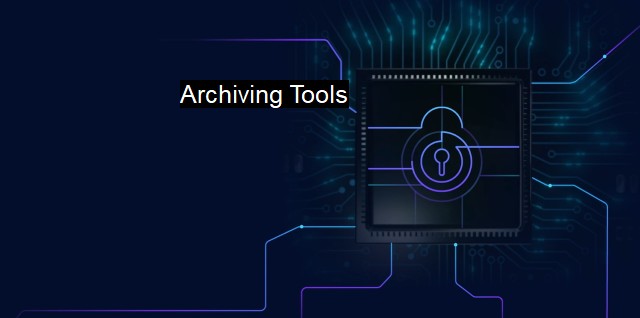What are Archiving Tools?
The Crucial Role of Archiving Tools in Cybersecurity and Antivirus: Safeguarding Digital Assets from Malicious Attacks and Data Breaches
Archiving tools are essential elements in the fields of cybersecurity and antivirus. They perform various functions, enabling individuals and organizations to preserve, manage, and track their data effectively.In the digital world, data is a valuable commodity that plays a pivotal role in almost all aspects of a business. From managing customer relationships, strategizing marketing efforts, to optimizing operational procedures, companies heavily rely on data. with a vast amount of data generated continuously, handling and storing such data securely becomes a pressing concern. This is where archiving tools come into play.
Archiving tools are software or services specifically designed to gather, compress, store, and provide access to data files, accommodating both small-scale personal needs and the extensive technological requirements of enterprises. They offer substantial benefits, including disk space reduction, improved data governance, legal compliance facilitation, and solid assurance of efficient data restoration during system failures.
In cybersecurity and antivirus context, archiving tools are of immense importance due to their data preservation functionality. The evaluated and stored data aid organizations to trace their steps when a cyber-attack occurs. It helps to identify attack sources and methods, devise countermeasures, and minimize the damage. Therefore, archiving tools contribute vastly to preventive measures and post-incident investigation, an integral part of any cybersecurity strategy.
One crucial note is that not all archiving tools are created equal, and their efficacy significantly depends on their built-in security features. Considering the increasing scope and sophistication of cyber threats today, archiving tools should be impervious to potential security risks. Trojans, viruses, worms, and other malicious agents concealed within seemingly benign files create potential vulnerabilities and exponentially increase risks for businesses. By adopting archiving tools incorporated with robust cybersecurity measures like virus scanning and malware detection, organizations can ensure the long-term, foolproof safety and readability of their archived files.
Advanced archiving mechanisms also enable encryption of archived data, which allows organizations to add an extra security layer to protect their sensitive data from unauthorized access. they offer access control features to ensure that only authorized personnel can recover and use the stored files, and that any access attempt is logged and monitored.
Archiving tools equipped with antivirus features can scan stored files regularly for possible intrusions. In case of detection, these tools isolate the corrupted file and prevent it from spreading malicious script further into the network. Besides, certain archiving tools could work in close conjunction with antivirus software to provide a more comprehensive protective shield by identifying and addressing vulnerabilities.
Lastly, while choosing an archiving tool, organizations must consider their ability to uniformly enforce policies, preserve and manage data repositories and filed emails, enable easy retrieval of data for audits and investigations, and provide automated alerts on suspicious activities.
To sum up, archiving tools are essential not only for efficient data management but also for serving as a robust line of defense against cyber threats. With a well-functional archiving tool, businesses can assure the integrity of their critical data by protecting, preserving, and monitoring it relentlessly. Therefore, considering the rapidly evolving challenge of cyber threats, investing in comprehensive archiving tools with solid cybersecurity measures should be a priority for every organization aiming to safeguard its digital assets.

Archiving Tools FAQs
What are archiving tools in the context of cybersecurity and antivirus?
Archiving tools are software programs used to compress and store large amounts of data or files into one single file or container. These tools help in organizing, securing, and managing files in a more efficient manner.How do archiving tools help in protecting against malware attacks?
Archiving tools help in protecting against malware attacks by providing an additional layer of security for files. By compressing files into a single container, it becomes more difficult for hackers to access and manipulate individual files. Moreover, some archiving tools have built-in encryption capabilities that provide added security against targeted attacks.What are some popular archiving tools used in cybersecurity and antivirus?
Some popular archiving tools used in cybersecurity and antivirus are WinZip, WinRAR, 7-Zip, Bandizip, and PeaZip. These tools are widely used due to their user-friendly interface, fast compression and decompression speeds, strong encryption capabilities, and wide compatibility with different file formats.Can archiving tools be used to store sensitive information?
Yes, archiving tools can be used to store sensitive information. However, it is important to ensure that the archiving tool used has strong encryption capabilities and is password protected. This will prevent unauthorized access to the archived data and provide an extra layer of security. It is also recommended to store the archived data in a secure location that is not easily accessible to others.| | A | | | B | | | C | | | D | | | E | | | F | | | G | | | H | | | I | | | J | | | K | | | L | | | M | |
| | N | | | O | | | P | | | Q | | | R | | | S | | | T | | | U | | | V | | | W | | | X | | | Y | | | Z | |
| | 1 | | | 2 | | | 3 | | | 4 | | | 7 | | | 8 | | |||||||